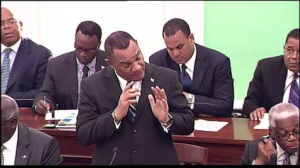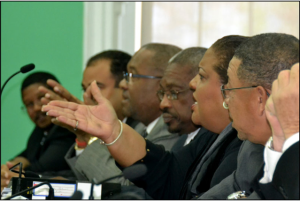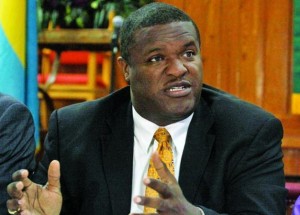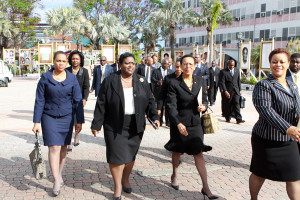In 2002 voters in The Bahamas rejected a national referendum “to change the Constitution to eradicate language that made men superior to women” – as the February 12, 2012, edition of the Nassau Guardian framed the issue. I was so shocked and dismayed that I wondered aloud if we were vying to become the new Taliban paradise, given that the United States had just bombed to smithereens the one that thrived in Afghanistan.
But I then had cause to put my shock and dismay on the record in 2009, when the government proposed legislation to ban marital rape:
This proposed legislation has incited such widespread moral outrage that one might think Bahamians were living in a Taliban paradise. Indeed, this condemnation exposes the fact that Christian fundamentalists, in many respects, are every bit as fanatical as Islamic fundamentalists.
Of course, much violence has been visited upon women in the name of Christianity. And none has been more insidious than marital rape sanctioned by the misogynistic edict that a woman must always obey her husband’s sexual commands … unconditionally.
(“Banning Marital Rape in The Bahamas,” The iPINIONS Journal, August 14, 2009)
This is why I am not at all surprised that a toxic mix of political ignorance and moral outrage is bedeviling the Bahamian government’s attempt to hold a second referendum to grant women equal rights.
 Specifically, for almost two years now, the government has been trying to move a series of bills through Parliament before putting them to a referendum. As the Guardian reported (on October 3, 2013), these amending bills are primarily intended to:
Specifically, for almost two years now, the government has been trying to move a series of bills through Parliament before putting them to a referendum. As the Guardian reported (on October 3, 2013), these amending bills are primarily intended to:
- Amend the citizenship provisions of the Constitution to achieve full equality between men and women with respect to the acquisition and transmission of Bahamian nationality; and
- Expand the definition of discrimination in Article 26 to include discrimination based on “sex” as a prohibited ground so that women would be able to enjoy the same level of protection from discrimination that men already enjoy.
Never mind the reasonable interpretation that Article 15 already grants women the fundamental rights and protections this referendum purports to grant, with its express provision that:
[E]very person in The Bahamas is entitled to the fundamental rights and freedoms of the individual, that is to say, has the right, whatever his race, place of origin, political opinions, colour, creed or sex [to] life, liberty, security of the person and the protection of the law [etc.].
In any event, the government appointed a Constitutional Reform Commission that waged a yearlong “public education campaign” to impress upon voters the existential importance of codifying these amendments.
 Unfortunately, political mischief and religious dogma have so undermined this campaign that the government seems poised, yet again, to postpone the enabling referendum, which is scheduled for this November. If it does, extraneous objections, of one form or another, will have postponed it for the fourth time, given previous postponements: from June 2013 to November 2013 to June 2014.
Unfortunately, political mischief and religious dogma have so undermined this campaign that the government seems poised, yet again, to postpone the enabling referendum, which is scheduled for this November. If it does, extraneous objections, of one form or another, will have postponed it for the fourth time, given previous postponements: from June 2013 to November 2013 to June 2014.
To appreciate a little of the pettiness involved, consider that members of the ruling party championing this latest effort are from the same party (the Progressive Liberal Party) whose members betrayed the effort in 2002 referenced above. And, presumably as payback, members of the opposition party maneuvering to betray this year’s effort are from the same party (the Free National Movement) whose members championed the effort in 2002.
 In other words, it has been and remains more about petty party politics than women’s equal rights.
In other words, it has been and remains more about petty party politics than women’s equal rights.
Given this tortured background, if the ruling PLP were serious about ushering in gender equality, it would have done so by an Act of Parliament (i.e., without pursing this fraught process of amending the Constitution).
Not to mention that it offends all notions of fundamental rights and fairness for the government to hold a referendum on whether Bahamian women should enjoy the same constitutional rights and protections Bahamian men already enjoy.
Mind you, the Constitution of The Bahamas does not expressly discriminate against women (e.g., the way the Constitution of the United States discriminated against Blacks) such that constitutional amendments would be necessary to correct an “original sin.” It just does not include “sex” in the Article 26 at issue – a long with “race, place of origin, political opinions, colour, or creed” (as it does in Article 15) – as a personal attribute that should not give rise to any form of discrimination.
But any fair and just interpretation of Article 26 by a competent court would hold that sex/gender is plainly implied. For example, the U.S. Constitution does not include the term “same sex.” Yet the Supreme Court ruled that its provisions necessarily imply that same-sex marriage is as fundamental a right as traditional marriage…
This is hardly the forum to delve any further into constitutional provisions, especially given that minds far more brilliant than mine can interpret them differently – as members of the U.S. Supreme Court demonstrate with distressing regularity these days. Therefore, I shall suffice to proffer that, because the Constitution does not expressly prohibit equal rights for women, no act of Parliament granting women those rights can be deemed to alter or violate it.
In fact, it is instructive that the Equality Act of 2010 did not violate the Constitution of the United Kingdom, and the Fair Pay Act of 2009 did not violate the Constitution of the United States. No referendum was needed in either case.
Perhaps even more instructive is that the United States has been trying since 1923, to no avail, to amend its constitution (with an Equal Rights Amendment) to guarantee equal rights for women. Yet acts of Congress over that time have slowly but surely redressed every case where the laws of the United States discriminated against women, such that nobody can gainsay that American women enjoy more equal rights than women anywhere else in the world today. (More famously, acts of Congress did the same with respect to civil rights for Blacks. They would still be living in Jim Crow America if their equal rights were dependent on a national referendum.)
Meanwhile, apropos of the spectre of postponement or outright cancellation, here’s the ominous, and arguably predictable, note the government sounded just days ago:
Whether we have a referendum or not, the prime minister has always said that we would not go to a referendum without general agreement between the parties…
If it becomes clear for us that there is not unanimity, then we will not proceed with the referendum.
(Nassau Guardian, August 9, 2014)
Ominous, and arguably predictable, because this is akin to the Obama Administration declaring that it will not proceed with a bill granting women unqualified rights to abortions … if there is not unanimity between Democrats and Republicans. Duh.
 What’s more, there’s a very high probability that voters will reject this latest referendum too, if it were ever held. Nothing telegraphs this quite like religious leaders hijacking the national debate, mostly by hurling ignorant fulminations about equal rights for women being dependent on what the meaning of ‘sex’ is.
What’s more, there’s a very high probability that voters will reject this latest referendum too, if it were ever held. Nothing telegraphs this quite like religious leaders hijacking the national debate, mostly by hurling ignorant fulminations about equal rights for women being dependent on what the meaning of ‘sex’ is.
I doubt, for example, that those voicing the loudest objections are even aware of the differences between “sex” (biological/sex organs) and “gender” (cultural norms/masculine, feminine). Gender is the more debatable term. But the irony is that this referendum would have been less controversial if the proposed expansion of the definition of discrimination included discrimination based on “gender” instead of “sex” as a prohibited ground.
As it stands, religious leaders are reading into the term ‘sex’ an expansion of the constitutional definition of discrimination based on ‘sexual orientation.’ Specifically, they fear the proposed update to Article 26 will provide homosexuals the same level of protection from discrimination heterosexuals already enjoy.
But the prevailing absurdity of this whole exercise is brought into eye-rolling relief when one considers that even the U.S. Constitution (as amended) does not prohibit discrimination based on sex or sexual orientation. This is why legislatures have been enacting laws to redress these omissions on a state-by-state basis – based on local religious and cultural norms.
Alas, such norms in The Bahamas militate against our pandering parliament following suit by enacting LBGT laws, let alone our homophobic people doing so by passing a referendum.
More to the point, in a country where religious leaders proselytize homophobia as an article of faith, this (mis)reading of the language in the tabled bills is spreading faster than the gospel at Pentecost. And whenever religion enters the house, reason hightails it out the back door.
 Frankly, one could be forgiven for thinking that this referendum is more about marriage for gays than equal rights for women.
Frankly, one could be forgiven for thinking that this referendum is more about marriage for gays than equal rights for women.
In any case, whether by using the word sex or gender, whether by an act of Parliament or referendum, it is a categorical imperative that the laws of The Bahamas provide women the same rights, privileges, and protections men enjoy. Period.
Accordingly, I urge all Bahamians to support this referendum, bearing in mind that, if only every female voter realized and acted upon her enlightened interest, it would pass in a landslide.
Related commentaries:
Banning marital rape…